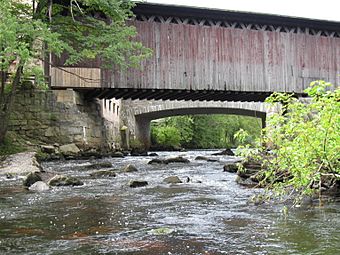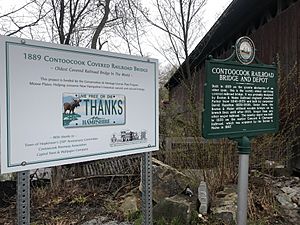Contoocook Railroad Bridge facts for kids
Quick facts for kids |
|
|
Hopkinton Railroad Covered Bridge
|
|
 |
|
| Location | Off NH 103 and NH 127 Hopkinton, New Hampshire (village of Contoocook) |
|---|---|
| Built | 1849-50, rebuilt 1889 |
| Architectural style | Doubled Town lattice truss |
| NRHP reference No. | 80000294 |
| Added to NRHP | January 11, 1980 |
The Contoocook Railroad Bridge is a special covered bridge located in the village of Contoocook, New Hampshire. It crosses the Contoocook River. This bridge is also known as the Hopkinton Railroad Covered Bridge because Contoocook is part of the town of Hopkinton, New Hampshire.
This historic bridge was built a long time ago in the 1800s. It is the oldest covered railroad bridge still standing in the United States! Trains used it until 1960. After that, it was used as a storage building until 1989. Today, it is public property and has been carefully saved by the state, donations, and volunteers. It stands proudly near the old railroad station.
A Look Back: The Bridge's History
This bridge was rebuilt in 1889. It replaced an earlier, lighter covered railroad bridge from 1849–50. The first bridge was built by the Concord and Claremont Railroad. Later, the Boston & Maine Railroad took over in 1887.
The Contoocook Bridge is the oldest of only four surviving "double-web Town lattice" railroad bridges. It is truly the oldest covered railroad bridge still around in the United States. Other similar bridges include Pier Bridge (1907) and Wright's Bridge (1906) in Newport, New Hampshire, and Fisher Bridge (1908) in Stowe, Vermont.
Jonathan Parker Snow (1848–1933), an engineer for the Boston & Maine Railroad, likely designed this bridge. David Hazelton (1832–1908), a carpenter, probably built it. The Boston & Maine Railroad used wooden bridges on its smaller lines longer than other big railroads. The last one was built in 1916. The nearby Contoocook Railroad Depot was built in 1850.
The Contoocook Bridge looks very much like it did when it was first built. Its main trusses are a "double Town lattice" design. They are continuous over a central pier, creating two sections about 71 feet long each. People used to say these bridges were "built by the mile and cut off by the yard." This means they were easy to build in sections. The center pier is angled to match the river's flow. The ends of the bridge, called abutments, are also angled. This is because the bridge crosses the river at a slant.
The bridge was used by trains until 1962. It survived a big flood in 1936 and a hurricane in 1938. It was even moved off its foundations twice by strong waters. Luckily, the train tracks running through it kept it from washing away completely. After its time as a railroad bridge, it was used as a warehouse from 1962 to 1990.
Keeping the Bridge Strong: Renovations
The Contoocook Covered Railroad Bridge has had many repairs to keep it strong. In August 2003, major work began. The National Society for the Preservation of Covered Bridges helped pay for this work. They hired Tim Andrews, an expert in barns and bridges. He lifted the sagging corners of the bridge. He also replaced old, decayed wooden parts.
The National Society has given a lot of money and time to help the bridge. They have repaired the side walls and the metal roof. They also bought special chemicals to protect the wood from fire. Volunteers have spent countless hours helping to maintain the bridge.
Tim Andrews used heavy steel I-beams for the repairs. He hoped to fix some of the bends the bridge got when it was knocked off its foundations. This happened during the flood of 1936 and the hurricane of 1938.
The Contoocook Bridge is one of only three covered bridges left on the old Concord and Claremont rail line. The other two are in Newport, New Hampshire. These three bridges are among the most amazing of the eight covered railroad bridges still existing in the world. The 1889 Contoocook Bridge is the oldest of them all.
After trains stopped using it in 1960, the bridge was owned by different private people. In 1989, the Town of Hopkinton took ownership. The town then gave the bridge to the State of New Hampshire in 1990. The state's Division of Historical Resources is now in charge of caring for it.
The National Society for the Preservation of Covered Bridges has been a big help. They have provided most of the money for repairs. The Division of Historical Resources also teamed up with the Contoocook Riverway Association. This group owns the nearby Contoocook Railroad Depot. Together, they received a special grant to restore both the bridge and the train station.
Future plans included installing a fire sprinkler system inside the bridge. They also planned to paint the outside using an old Boston and Maine Railroad paint color. Signs and security lighting were also added.
In 2006, the bridge had more small repairs. Parts of its bottom structure were fixed. The wooden supports were replaced with strong granite pedestals. This work was paid for by a donation from the National Society for the Preservation of Covered Bridges.
More changes were completed in 2009-2010. A fire sprinkler system was installed inside the bridge. It included heat detectors and a fire alarm. A special fire-resistant coating was added to the wood. LED motion-sensor lights were also put in. The New Hampshire Department of Transportation paid for and designed these improvements.
In April 2019, volunteers helped stain the bridge and make small repairs. This project was paid for by the state's "Moose Plate" grant program. Volunteers from the town's 250th anniversary committee and the Contoocook Riverway Association worked hard to complete the project.
Gallery







